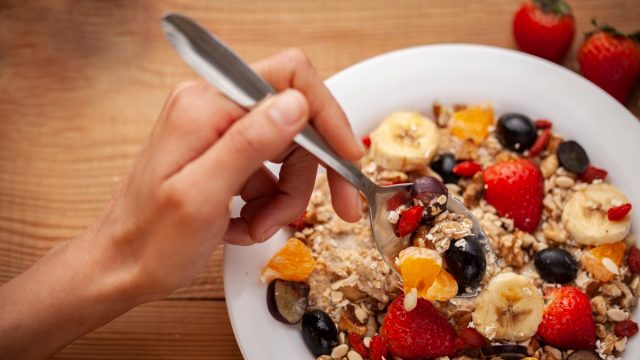I’m a Longevity Expert and Here’s Why You Need More Fiber in Your Diet

A lot of us prioritize eating healthy foods to live longer, which is probably why there’s been a surge of interest in the “Blue Zone” diet over the last year. The diet is based on the eating habits of people living in the Blue Zones, or the five regions of the world with the highest concentrations of individuals living to be over 100 years old: Okinawa, Japan; Sardinia, Italy; Nicoya, Costa Rica; Ikaria, Greece; and Loma Linda, California. But Dan Buettner, the longevity expert who first identified the Blue Zones, now says it doesn’t matter what you eat if you don’t have enough fiber in your diet.
RELATED: 116-Year-Old Woman With No Major Health Issues Reveals Her Longevity Diet.
On Dec. 29, Buettner shared a clip of an interview he did with Habits & Hustle podcast host Jennifer Cohen on his official Instagram page. In the video, the longevity expert explained that fiber is the one thing most people in the U.S. overlook.
“In the standard American diet—chips, burgers, pork chops, pizza—there’s almost no fiber there,” he told Cohen.
Fiber intake mainly affects your gut, which contains “about 100 trillion bacteria,” according to Buettner. “The only thing those healthy bacteria eat is fiber.”
When you eat enough fibrous foods, the bacteria in your gut will ferment that fiber and produce short-chain fatty acids (SCFAs). “These keep your immune system finely tuned, keep your inflammation in check, and govern your mood,” Buettner shared.
In fact, recent research has determined that SCFAs play an important role in health and disease prevention, Verywell Health reported. According to the outlet, some of their known health benefits include preventing inflammatory bowel disease (IBD), reducing diarrhea, lowering colon cancer risk, helping control blood sugar levels, protecting heart health, and supporting healthy weight maintenance.
RELATED: 10 Best Foods to Eat in the Morning for a Faster Metabolism, Nutritionists Say.
On the flip side, not getting enough fiber can have harmful effects.
“If you’re eating a standard American diet, you’re starving those bacteria and they go to work at your intestinal lining,” Buettner explained. “You often get leaky gut disease. It’s a mess.”
The current dietary guidelines from the U.S. Department of Agriculture (USDA) indicate that you should be getting 14 grams of fiber per every 1,000 calories of food. But according to a 2017 study published in the American Journal of Lifestyle Medicine, only about 5 percent of the population meets this recommendation. Instead, most people’s fiber intake overall is just 16.2 grams daily.
“Some of the best sources of dietary fiber include: beans and peas, vegetables, fruits, whole grains, and nuts,” the USDA states on its website.
But be careful. One of the major problems people face when trying to incorporate more fiber into their diet is upping their intake too quickly, Judith Wylie-Rosett, a professor at the Albert Einstein College of Medicine in New York City who specializes in the links between nutrition and disease, told the American Heart Association (AHA).
“Some people suddenly decide to increase their fiber intake all at once and get side effects, like feeling gassy and bloated,” she explained. “So they quit doing it.”
Best Life offers the most up-to-date information from top experts, new research, and health agencies, but our content is not meant to be a substitute for professional guidance. When it comes to the medication you’re taking or any other health questions you have, always consult your healthcare provider directly.